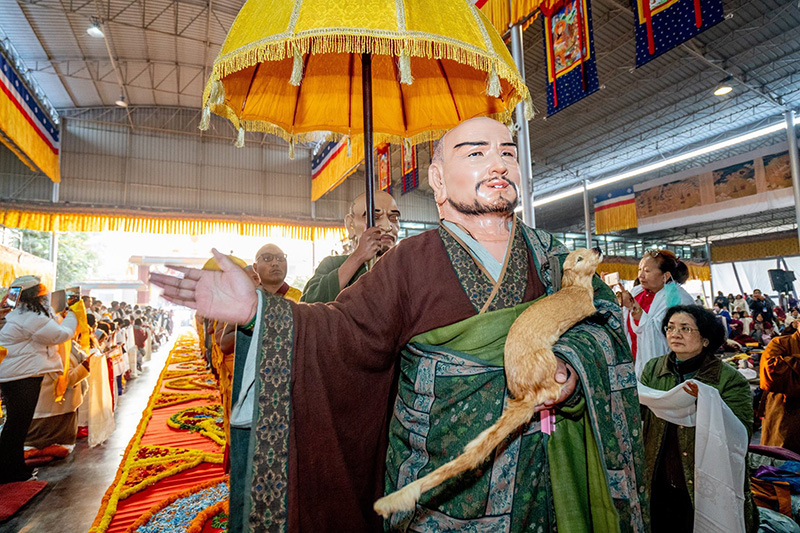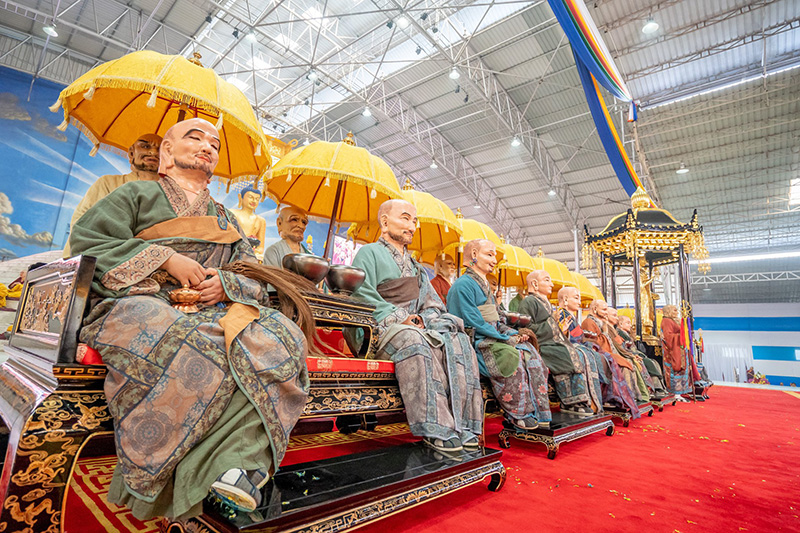At the time of the 7th Karmapa, Chodrak Gyatso, there used to be a procession called the Chakkor, which went around the Great Encampment. Monks dressed as the Sixteen Arhats, accompanied by their retinue, formed part of that procession. The 9th Karmapa,Wangchuk Dorje, added the Buddha and two of his disciples to the procession.
In 2014, the 17th Gyalwang Karmapa, Ogyen Trinley Dorje, revived this tradition and combined it with the annual Alms Procession.
The Sixteen Arhats were chosen by Shakyamuni Buddha himself from amongst his disciples. He asked them to remain in the world, protecting the Dharma for as long as beings were capable of benefiting from the teachings, and so, at the time of the Buddha’s parinirvana, the Arhats vowed to remain in the world and maintain the Dharma until the teachings came to an end, which will happen when the next World Buddha appears.
In 2014, His Holiness explained the purpose of the Alms Procession:
We’re inviting the Arhats to join…mainly in order to help the Dharma flourish. The Dharma teachings are the sole medicine, the sole salve for all sentient beings. It’s the only medicine to eliminate the sufferings of sentient beings
.

1. The preparations for the procession take place in the shrine room at Tergar. Monks put on their costumes

2. and then sit silently in contemplation with the monks who will form their entourage. The procession, like the Cham ritual dance, is a sacred activity for the monks taking part.

3. Each Arhat wears a distinctive mask.

4. These masks are based on drawings of the Arhats by His Holiness the 17th Karmapa. The Arhats were actually Indian, but the drawings are in the Chinese style.

5. The Arhats line up inside the shrine room, ready to begin the procession.

6. The Arhats and their retinues will walk along a beautiful, colourful carpet of designs made from flowers. Meanwhile, in the Pavillion, the congregation chants the prayer: Offerings to the Sixteen Arhats.

7. The first Arhat to emerge is Angaja. His accoutrements are an incense pot and fly whisk. The attendant behind holds a golden parasol above his head.

8. Arhat Kanakavatsu holds a jewelled lasso.

9. Each Arhat is followed by his retinue, monks holding alms bowls correctly: supporting the bowl with their left hand and steadying it with their right. As they walk, they chant Shakyamuni Buddha’s mantra: oṃ mune mune mahāmunaye svāhā

10. The Arhats are escorted by nuns walking ahead with incense and victory banners.

11. The road is lined with devotees offering katags. As they proceed, the Arhats turn slightly every so often to show their accoutrements, the symbols of their activity, to the devotees.

12. Arhat Nagasena holds a vase and a ringing staff.

13. The procession enters the Monlam Pavillion.

14. On stage, Gyaltsab Rinpoche, the Rinpoches, tulkus, khenpos and gelongs and gelongmas stand respectfully to receive the Arhats.

15. Arhat Bakula holds a mongoose.

16. Arhat Rahula, holding a precious crown.

17. Slowly the Arhats weave their way through the Pavillion towards the stage, on a red carpet covered in orange and yellow marigolds.

18. A statue of a golden standing Buddha, carried in on a cart, escorted by monks brings up the rear of the procession.

19. The Arhats take their seats on the stage.

20. The golden Buddha is placed in a special pagoda shrine.

21. The Monlam resumes with the 20 Branch Monlam of Offerings, performed by Chopon Osel Nyingpo.

22. Tsurphu Labrang, the Karmapa’s Office of Administration, is first to make offerings to the Arhats, followed by Gyaltsab Rinpoche’s Labrang.

23. And then lay people come forward to place their offerings in a giant cauldron.

24. Finally, the Arhats leave the stage.

25. And the Gelongs and Gelongmas are left on stage to eat their lunch in silence.


































